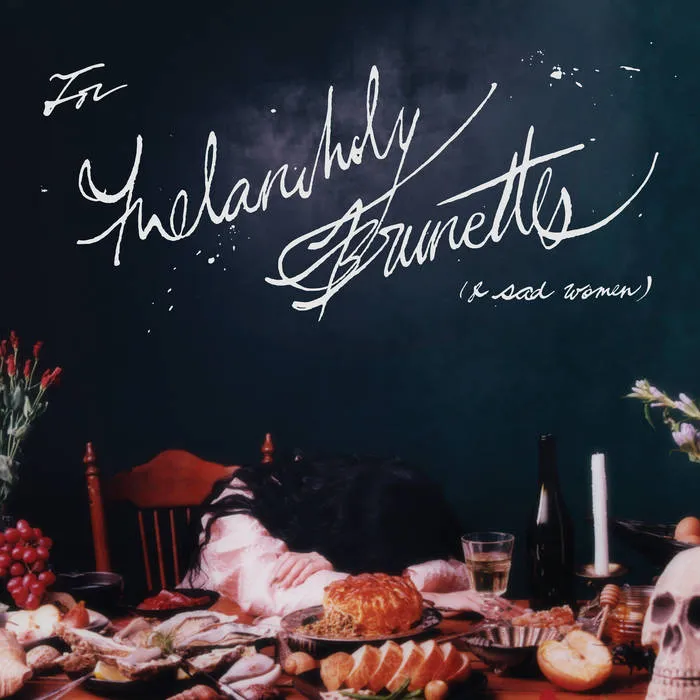National Music Reviews
Japanese Breakfast
For Melancholy Brunettes (& sad women)
Dead Oceans
Street: 03.21.25
Japanese Breakfast = Weyes Blood x Angel Olsen
When Michelle Zauner announced the release of her fourth album, I was initially put off by the cheeky title that smacks of bad Tumblr poetry and the album art reminiscent of Anna Marie Tendler’s pandemic-era self-portraits — both seemed, to me, like a romantic ideal of depression. But if there were ever any fears that the album would be inauthentic or trite, those were quickly assuaged by the lead single “Orlando in Love,” which paints a whimsical myth of a friar seduced by a siren, “leaving him breathless and then drowned.” Sure, it’s extravagant and theatrical, but to some extent basking in melancholy is human nature, isn’t it?
Some may view For Melancholy Brunettes (& sad women) as the next logical evolution after Japanese Breakfast’s third album Jubilee, both named after opposite emotions, but I see it more as a sequel to her debut album Psychopomp. Written in the immediate aftermath of Zauner’s mother’s death, Psychopomp was fueled by the acute grief that squeezes your lungs until you can’t think straight. Melancholy Brunettes is imbued with pensive, lingering grief that sits on top of you like a thin veil you can’t shake. In her 2021 memoir Crying in H Mart, Zauner wrote, “For the rest of my life there would be a splinter in my being, stinging from the moment my mother died until it was buried with me.” In 2025, just over ten years since her death, the initial wound has healed but the splinter is still there, just below the skin.
This is not to say that the album is centered on her mother, as was her memoir. Among other things, Melancholy Brunettes is a slow burn meditation on the self-inflicted consequences of desire, reconnecting with an estranged father and reconciling with disloyalty and distance from a lover. It’s ripe with lyrical callbacks and references to tragic mythical and literary figures — Venus, Icarus, Leda and more. As Japanese Breakfast’s first album recorded in a formal studio (and produced by Blake Mills, who has worked with the likes of Fiona Apple and Perfume Genius), its orchestral, full-bodied sound takes up space in a room. As usual, however, Zauner’s bright, earnest voice shines and shimmers above the noise.
“Honey Water” follows a narrator who responds to her unfaithful lover by numbing herself and choosing not to leave. Like Mitski’s “Me and My Husband,” the singer’s nonchalant attitude conceals something nastier, even poisonous, under the surface. The melody is hypnotically repetitive, echoing “So it goes / I don’t mind,” like a doomed affirmation as the psychedelic guitar builds, then suddenly releases. Meanwhile, “Little Girl” and “Leda” don’t mask anything — the two almost-lullabies see her stepping into her father’s shoes as she recalls their fraught relationship. In fact, much of Melancholy Brunettes involves exploration of other people’s perspectives, sometimes in a way that is tender and non-judgemental, and sometimes in a way that is more sinister. The jaunty shuffle “Mega Circuit” — about young boys getting sucked into the trap of toxic masculinity, driving around ATVs and shooting blanks with “incel eunuchs” — is the latter.
“All of my ghosts are my home,” Zauner croons on “Picture Window,” which just might be my favorite song on the album. Here, she is the one who is struggling to understand her partner, whom she loves more than life itself but who does not feel the same anxiety about death that she does. The music video, which feels very much like a short film, follows a young couple charging through the streets of Seoul — one trailing behind the other, terrified.
The album is bookended by two strings-heavy songs that come to peace with the coexistence of depression and love. The overture “Here is Someone” twinkles like wind chimes while “Winter in LA” has a certain swing to it not unlike the The Velvet Underground. Each is as poignant as they are plain: starting with “Life is sad but here is someone” and ending with “I wish you had a happier woman.” Zauner knows exactly when to wrap herself in flowery metaphors and when to state a simple truth. For Melancholy Brunettes (& sad women) is a winking nod to people who notice when they happen to be crying on a really beautiful street. There’s no shame in admitting to the perverted pleasure of wallowing for a while. —Asha Pruitt
Read more reviews of Japanese Breakfast albums:
Review: Japanese Breakfast – Jubilee
Review: Japanese Breakfast – Soft Sounds from Another Planet

